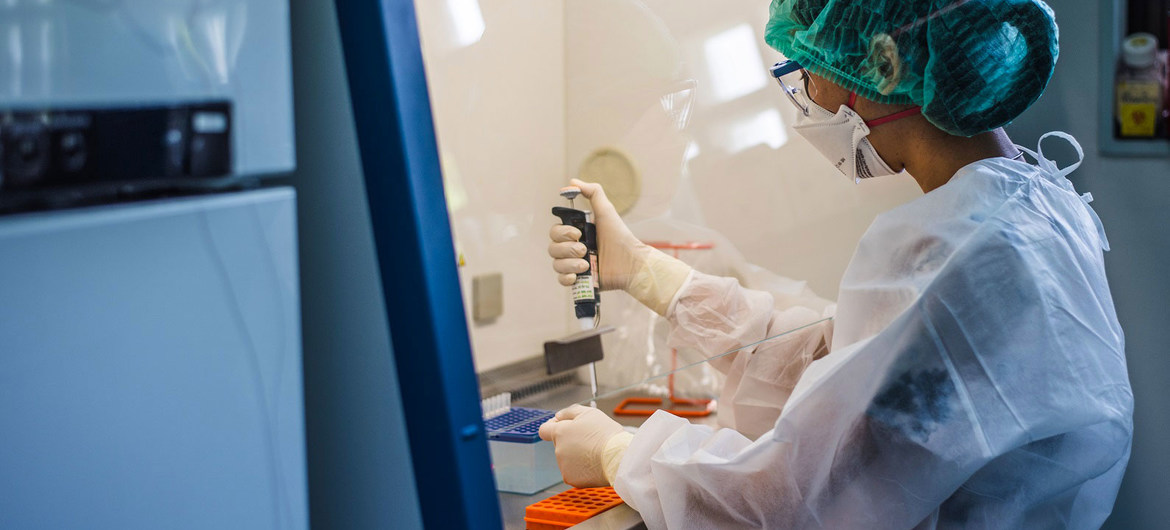Latin America and the Caribbean Institutions to receive grants to support the elimination of communicable diseases
Release – Six institutions from Argentina, Brazil, Haiti, México and Perú will receive research grants for topics related to Tuberculosis and other opportunistic infections in advanced HIV, sexually transmitted infections, and Human T cell lymphotropic virus (HTLV-1), which may cause a type of cancer.
These grants of around 30,000 dollars are provided as part of the “Operational research to support the elimination of communicable diseases in the Latin American and Caribbean region” initiative of the Pan-American Health Organization (PAHO) and TDR (the Special Programme for Research and Training in Tropical Diseases of UNICEF, the United Nations Development Program (UNDP), the World Bank and the World Health Organization (WHO)).
“Operations research is key to generating evidence and information that allows progress towards eliminating diseases in Latin America and the Caribbean,” said Dr. Massimo Ghidinelli, interim Director of Communicable Diseases and Environmental Determinants of Health at PAHO. “Grants for these investigations will expand our knowledge and strengthen public health response,” he said.
“We are very pleased to see these very promising projects being identified. We are confident that working with PAHO and the grantees, we will have results from this work to support the elimination initiative in the Latin America and Caribbean Region”, said Dr. Garry Aslanyan, Manager of Partnerships and Governance at TDR.
Around 2.5 million people living with HIV in Latin America and the Caribbean. It is estimated that, in the region, 291,000 people contracted tuberculosis in 2020, 10% of whom were living with HIV. Sexually transmitted infections (STIs), which are easily curable, affect approximately 38 million people between the ages of 15 and 49 in the region, according to the latest WHO estimates. Meanwhile, it is estimated that between 5 and 10 million people are infected with HTLV-1 worldwide.
Institutions and selected projects:
- UBATEC S.A. – Technology Transfer Unit of the University of Buenos Aires, Argentina. Strengthening working groups in Health and Science to optimize human T-cell lymphotropic virus surveillance in Argentina, Chile, Colombia and Uruguay.
- Evandro Chagas National Institute of Infectious Diseases – INI Oswaldo Cruz Foundation, Brazil: Opportunistic infections caused by fungi and mycobacteria in patients with HIV/AIDS: Importance of rapid methods in the laboratory diagnosis of cryptococcosis, histoplasmosis and tuberculosis.
- Carlos Chagas Filho Institute of Biophysics, Federal University of Rio de Janeiro, Brazil: Vertical transmission of human T-cell lymphotropic virus (HTLV): Validation of integrase inhibitors’ protective effect on the transmissibility of infected dairy inoculum and the importance of oral fluid for diagnosis.
- Zanmi Lasante, Haiti: Assessing the feasibility of using community health workers (CHWs) to conduct contact tracing through home testing for sexually transmitted infections (STIs).
- National Institute of Respiratory Diseases Ismael Cosio Villegas, Mexico: Protocol for implementing rapid diagnostic studies of opportunistic infections in reference centers in Mexico City.
- Universidad Peruana Cayetano Heredia, Peru: Notification systems for sexual partners to accelerate treatment and improve the management of STIs.
Grants may cover research time, data collection and analysis, and other related activities.
The teams responsible for the projects selected will develop, in coordination with PAHO and TDR, a protocol to carry out operational research, which will undergo evaluations by ethics committees at the national and regional levels. Data collection activities will then begin. Technical assistance will be provided throughout activities to ensure the production of valid and relevant research results and to assist in integrating the results into the program, policy and/or the health system.
It is expected that every recipient will publish a peer-reviewed article as well as a policy brief to demonstrate how interventions have improved as part of the disease elimination strategy.



